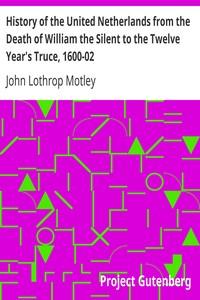|
|
Read this ebook for free! No credit card needed, absolutely nothing to pay.Words: 20527 in 7 pages
This is an ebook sharing website. You can read the uploaded ebooks for free here. No credit cards needed, nothing to pay. If you want to own a digital copy of the ebook, or want to read offline with your favorite ebook-reader, then you can choose to buy and download the ebook.

: History of the United Netherlands from the Death of William the Silent to the Twelve Year's Truce 1609 by Motley John Lothrop - Netherlands History Eighty Years' War 1568-1648@FreeBooksTue 06 Jun, 2023 Edition: 10 HISTORY OF THE UNITED NETHERLANDS From the Death of William the Silent to the Twelve Year's Truce--1609 History of the United Netherlands, 1609 Vote of the States-General on the groundwork of the treaty-- Meeting of the plenipotentiaries for arrangement of the truce-- Signing of the twelve years' truce--Its purport--The negotiations concluded--Ratification by the States-General, the Archdukes, and the King of Spain--Question of toleration--Appeal of President Jeannin on behalf of the Catholics--Religious liberty the fruit of the war--Internal arrangements of the States under the rule of peace--Deaths of John Duke of Cleves and Jacob Arminius--Doctrines of Arminius and Gomarus--Theological warfare--Twenty years' truce between the Turkish and Roman empires--Ferdinand of Styria-- Religious peace--Prospects of the future. On the 11th January, 1609, the States-General decided by unanimous vote that the first point in the treaty should be not otherwise fixed than, thus:-- "That the archdukes--to superfluity--declare, as well in their own name as in that of the King of Spain, their willingness to treat with the lords States of the United Provinces in the capacity of, and as holding them for, free countries, provinces, and states, over which they have no claim, and that they are making a treaty with them in those said names and qualities." It was also resolved not to permit that any ecclesiastical or secular matters, conflicting with the above-mentioned freedom, should be proposed; nor that any delay should be sought for, by reason of the India navigation or any other point. In case anything to the contrary should be attempted by the king or the archdukes, and the deliberations protracted in consequence more than eight days, it was further decided by unanimous vote that the negotiations should at once be broken off, and the war forthwith renewed, with the help, if possible, of the kings, princes, and states, friends of the good cause. This vigorous vote was entirely the work of Barneveld, the man whom his enemies dared to denounce as the partisan of Spain, and to hold up as a traitor deserving of death. It was entirely within his knowledge that a considerable party in the provinces had grown so weary of the war, and so much alarmed at the prospect of the negotiations for truce coming to nought, as to be ready to go into a treaty without a recognition of the independence of the States. This base faction was thought to be instigated by the English Government, intriguing secretly with President Richardot. The Advocate, acting in full sympathy with Jeannin, frustrated the effects of the manoeuvre by obtaining all the votes of Holland and Zeeland for this supreme resolution. The other five provinces dared to make no further effort in that direction against the two controlling states of the republic. It was now agreed that the French and English ambassadors should delay going to Antwerp until informed of the arrival in that city of Spinola and his colleagues; and that they should then proceed thither, taking with them the main points of the treaty, as laid down by themselves, and accepted with slight alterations by the States. When the Spanish commissioners had signed these points the plenipotentiaries were to come to Antwerp in order to settle other matters of less vital import. Meantime, the States-General were to be summoned to assemble in Bergen-op-Zoom, that they might be ready to deal with difficulties, should any arise. The first meeting took place on the 10th February, 1609. The first objection to the draught was made by the Spaniards. It was about words and wind. They liked not the title of high and puissant lords which was given to the States-General, and they proposed to turn the difficulty by abstaining from giving any qualifications whatever, either to the archdukes or the republican authorities. The States refused to lower these ensigns of their new-born power. It was, however, at last agreed that, instead of high and mighty, they should be called illustrious and serene. Free books android app tbrJar TBR JAR Read Free books online gutenberg More posts by @FreeBooks
: History of the United Netherlands from the Death of William the Silent to the Twelve Year's Truce 1602-03 by Motley John Lothrop - Netherlands History Eighty Years' War 1568-1648@FreeBooksTue 06 Jun, 2023

: History of the United Netherlands from the Death of William the Silent to the Twelve Year's Truce 1600-02 by Motley John Lothrop - Netherlands History Eighty Years' War 1568-1648@FreeBooksTue 06 Jun, 2023
|
Terms of Use Stock Market News! © gutenberg.org.in2025 All Rights reserved.






